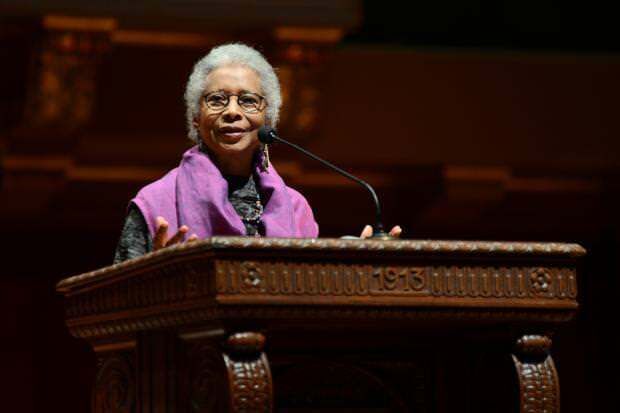By Charlotte Jenkins, Daily Staff Reporter https://www.michigandaily.com/people/chjenks/Charlotte%20Jenkins
Published November 5, 2014
Alice Walker, the Pulitzer Prize-winning author, poet and social justice activist, spoke to a packed Hill Auditorium Wednesday night at the 20th Annual Zora Neale Hurston Lecture.
Walker’s most notable piece is her award-winning novel “The Color Purple.” She is also known for her work on social justice and feminist issues. The University Department of Afroamerican and African Studies and the Center for the Education of Women sponsored the annual lecture, which aims to honor Hurston, a noted African American author, by bringing prominent scholars to campus.
Walker opened by acknowledging the controversy surrounding the University’s rescindment of the invitation it had extended to her to speak at the Center for the Education of Women’s 50th Anniversary event last August. Walker was scheduled to speak at the event but was uninvited by the University, allegedly because donors for the event threatened to cancel their funding because of her views on the Israeli-Palestinian conflict.
“As many of you know, it was not ordained that I should be here,” Walker said. “In its own way, I think it was divine justice that I should be here.”
Walker said she was thrilled to speak at a lecture named for Hurston, a well-known pioneering African-American author and anthropologist whom Walker said she considers a mentor and inspiration.
Walker’s talk focused on the theme of friendship, examining the different kinds of friendship that exist. She also emphasized the importance that creating connections has in achieving world peace.
“Friendship is really important, and not just between men and women and women and women and people you know; it’s important between countries,” Walker said.
She is a vocal social justice advocate and explained the critical potential she believes global diplomacy can have in preventing war and other atrocities.
“We in this country are in the habit of dropping bombs on people, dropping napalm on people, dropping drones on people,” Walker said. “The only way we will save ourselves, the water, the mountains that haven’t been decapitated … is if we do it as friends, on a global scale.”
In her lecture, Walker said the midterm election held Tuesday was futile and that the American political process is not on the path to actual change. She discussed her belief in the need for a new system — one that defies politics.
“I see the political system as not only born broken, but unfair, and destined to be unfair forever,” she said. “If we really want to have a world that is safe for our children, we really need to have more imagination than to just talk about red states and blue states and Republicans and Democrats.”
Walker characterizes herself as a “womanist,” and believes this is important in her activism. DAAS Professor Michael Awkward, founder of the Zora Neale Hurston Lecture, mentioned in an interview with the Daily that Walker uses the term “womanist” to “signify that gender equity for Black American women is impossible to imagine until we recognize that the lives of Black women and men are inextricably bound together.”
Walker discussed her opposition to war and how she wrote a children’s book titled “Why War is Never a Good Idea.” She said her strong anti-war and anti-apartheid opinions contribute to her opposition to the Israeli occupation of the Gaza strip.
During the question and answer portion of the event, an audience member asked about Walker’s view of the conflict in Gaza, and Walker responded by again emphasizing the importance of friendship and empathy. She also compared the struggle of the Palestinians with that of African-American slaves, saying it is critical that the situation be resolved.
“There’s something about that situation that is really crucial for the world to understand,” she said. “If we don’t understand what’s happening there, I don’t think we can make it as a world. It’s that crucial.”
Another question posed to Walker was about how people achieve friendship and peace among others who murder and commit atrocities.
“I think it’s more about compassion, that they are such a mess, and what they’re missing in life,” Walker said. “I’m not eager to go to the prom with those men in that group in Nigeria, but it has a lot to do with your own capacity to have empathy for people,” she said in reference to an incident in April when terrorists from the Islamic extremist group Boko Haram kidnapped almost 300 young girls.
Walker shared a few of her poems throughout the lecture, including one titled “Hope,” which she said was dedicated to humanity.
“Hope that every failure is an arrow pointing towards enlightenment,” she read. “Hope to sin only in the service of waking up.”
Source: Michigan Daily https://www.michigandaily.com/news/alice-walker-speaks-campus-after-being-disinvited-last-year

